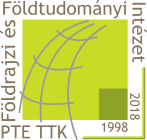
Department of Cartography and Geoinformatics
Head: Dr. Titusz Bugya, PhD
The mission of the Department of Cartography and Geoinformatics, Institute of Geography, is to practice teaching and research in physical geography, cartography and astronomy, taking advantage of the opportunities offered by modern informatics. New attitudes and research techniques in modern geography and the revolutionary progress of information technology create new conditions for teaching and research at the Department and increases the competitiveness of the Institute and its graduate and PhD students. The wide array of international contacts of our staff allows the application of the most recent research findings in practice and geography teaching. With the new opportunities offered by geoinformatics, in addition to geographical education (for BSc and MSc students of Geography and Environmental Sciences, teacher training, specializations and doctoral courses), we are willing to contribute to teaching and research in other institutes of the Faculty of Sciences. Also in applied research, digital mapping and remote sensing provide novel challenges and opportunities.
A further task of the Department is the investigation of spatial interactions in the physical environment and its translation into teaching. The Department has a major share in the teaching of core subjects both in graduate and postgraduate training. In the physical geographical laboratory and during fieldwork organised by the Department, students acquire practical skills utilised in optional courses of research methodology and global and regional environmental problems. To traditional geomorphological, hydrological, pedological and complex settlement environmental research, recently landscape geography has been added, serving the practical application of geographical knowledge and the strengthening of applied physical geography and landscape ecology. Land evaluation studies aim at presenting agro-ecological potentials through GIS. Investigations into the environmental conditions in Southern Transdanubia reveal the opportunities of settlement development, including the identification of environmental types and dynamics. Another applied trend is engineering geomorphology focusing on the socio-economic impacts of geomorphological processes and the spatial distribution of natural hazards. The above topics are open for the choice of PhD students.

.jpg)